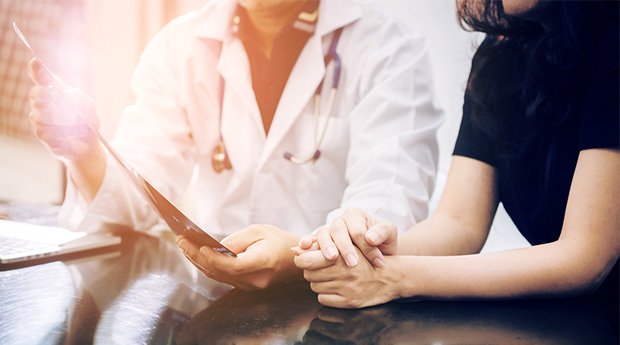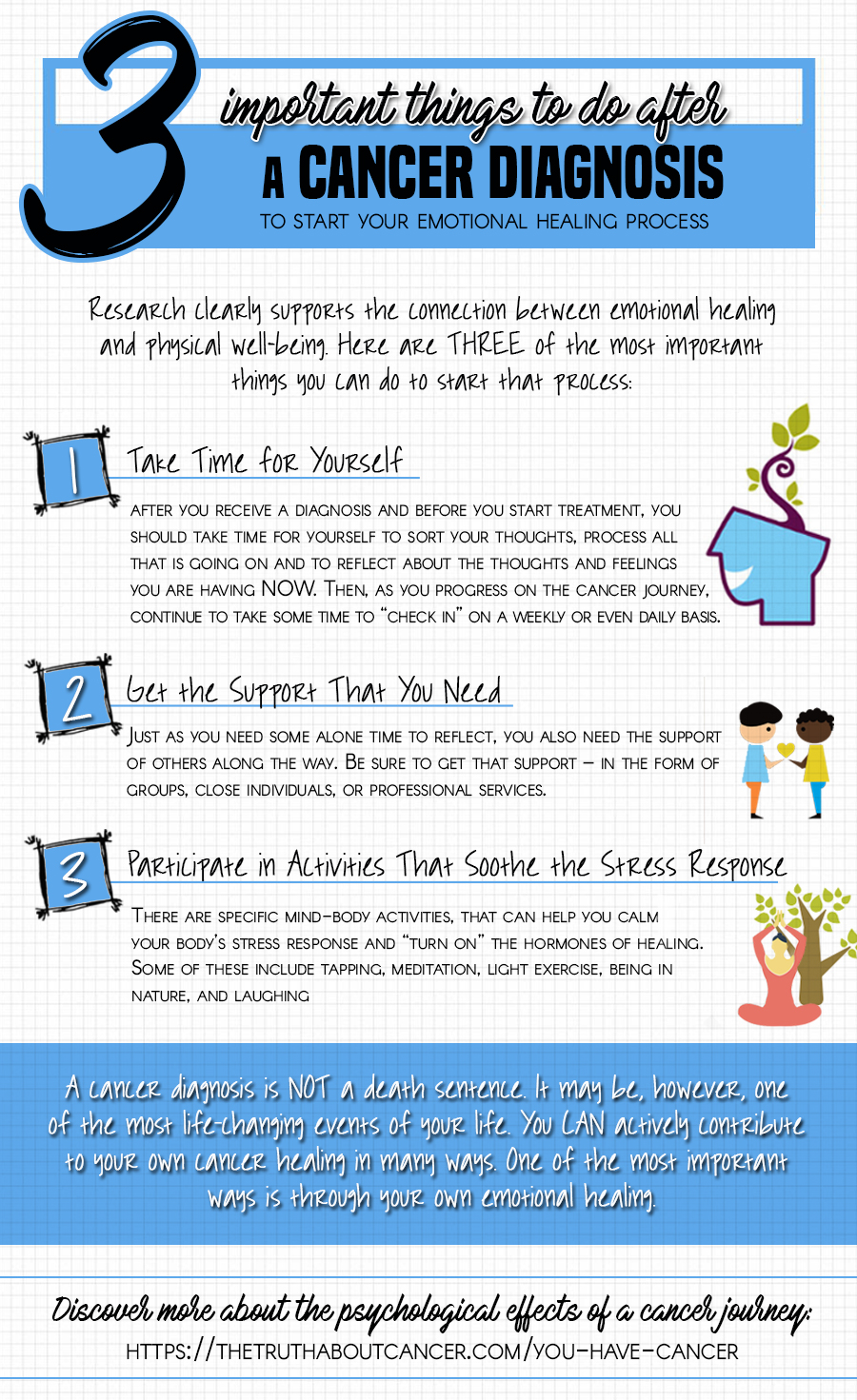“I Have Cancer”: 3 Steps to Take After a Cancer Diagnosis

Being
told that you have cancer is one of the most stressful events you may
ever go through. But what exactly ARE the psychological effects of the
cancer journey? And most importantly, what practical steps can you take
so that your body has the best chance to heal?
diagnosis can affect how well your body functions on a genetic level. Since then, this theory has been proven by dozens of other studies.
Hearing the news that you have cancer, and especially HOW you receive it, has a very real impact on both your mental and physical health. Here are a few statistics to back this up:
Even if you are surrounded by caring friends and family, you may still feel like you are all alone on the journey. Unfortunately, research suggests that anxiety and depression that results from social isolation can impair immune function and increase the inflammatory response.
Watch for signs that you are experiencing social isolation as a result of your cancer experience. These may include feeling misunderstood by family and friends and censoring what you say to those who care about you. It can also include feeling as if everyone else has moved on with their lives while you are still “going through” the cancer ordeal, even months and years after it is over.
This appointment doesn’t need to be long; a mere fifteen minutes to half an hour may be all you need. Have a blank journal and a pen handy to write down your thoughts and feelings as they come up, along with any insights you may have.
Then, as you progress on the cancer journey, continue to take some time to “check in” on a weekly or even daily basis. Remember that healing from cancer naturally is not just about what treatments or supplements you take. It is also about taking care of the all the “messy” emotions that will inevitably rise to the surface.
You may feel helpless in the face of the strong negative feelings that may sweep over you. In our culture, we often feel as if we have to “do” something about it. Feelings, however, sometimes just need to be “felt.” As you schedule time to reflect, practice the art of simply “being” with whatever emotion is coming up.
Try to observe the emotion as if someone else were having it. Do not hold on to it nor try to make it go away. Eventually, it WILL go away. That is guaranteed, no matter how intense it may be in the moment!
You may question what the point is of sitting and observing emotions. Surprisingly, however, most experts agree that simply “being with” what is happening is one of the best thing you can do for your overall healing. Through practicing acceptance, you are not allowing the “fight or flight” state − and the release of cortisol that comes with it − to take a hold of you. You can relax and allow the parasympathetic nervous system to do its job of healing your body.
Some of these modalities include Tapping, meditation, light exercise, being in nature, and laughing (just turn on a funny movie and indulge in a good chuckle).
Remember that a cancer diagnosis is NOT a death sentence. It may be, however, one of the most life-changing events of your life. You CAN actively contribute to your own cancer healing in many ways. One of the most important ways is through your own emotional healing.

What Research Says About Receiving “the News”
Close to four decades ago, Dr. R.G. Hamer examined the brain x-rays and actual tumor locations of over 20,000 cancer patients. He surmised that psychological stress, no matter the cause, can lead directly to DNA damage. This means that the anxiety and depression you feel from a cancerdiagnosis can affect how well your body functions on a genetic level. Since then, this theory has been proven by dozens of other studies.
Hearing the news that you have cancer, and especially HOW you receive it, has a very real impact on both your mental and physical health. Here are a few statistics to back this up:
- A German study published in 2016 found that over 80% of all new breast cancer patients displayed some kind of PTSD symptoms between the time they were diagnosed and the time they started treatment.
- As many as 30% of all cancer patients are clinically diagnosed with depression shortly after they receive a diagnosis.
- According to Lissa Rankin, MD, doctors within our modern medical establishment can have a GREAT impact over our healing process simply by how they break the news.
“The literature
shows that patients believed to be terminal who are mistakenly informed
that they only have a few months to live have died within their given
time frame, even when autopsy findings reveal no physiological reasons
for the early death,” says Rankin in her book, Mind Over Medicine.
It’s Normal to Feel Isolated When You Have Cancer
Cancer is now a cultural phenomenon − 40% of Americans will be diagnosed at some point in their lives. Still, feeling that “no one understands what I am going through” is very normal.Even if you are surrounded by caring friends and family, you may still feel like you are all alone on the journey. Unfortunately, research suggests that anxiety and depression that results from social isolation can impair immune function and increase the inflammatory response.
Watch for signs that you are experiencing social isolation as a result of your cancer experience. These may include feeling misunderstood by family and friends and censoring what you say to those who care about you. It can also include feeling as if everyone else has moved on with their lives while you are still “going through” the cancer ordeal, even months and years after it is over.
3 Things You Can Do NOW if You’ve Been Diagnosed With Cancer
Research clearly supports the connection between emotional healing and physical well-being. Here are three of the most important things you can do to start that process:#1. Take Time for Yourself
As soon as possible after you receive a cancer diagnosis and before you start treatment, schedule an appointment with yourself. This will allow you to process all that is going on and to reflect about the thoughts and feelings you are having NOW.This appointment doesn’t need to be long; a mere fifteen minutes to half an hour may be all you need. Have a blank journal and a pen handy to write down your thoughts and feelings as they come up, along with any insights you may have.
Then, as you progress on the cancer journey, continue to take some time to “check in” on a weekly or even daily basis. Remember that healing from cancer naturally is not just about what treatments or supplements you take. It is also about taking care of the all the “messy” emotions that will inevitably rise to the surface.
You may feel helpless in the face of the strong negative feelings that may sweep over you. In our culture, we often feel as if we have to “do” something about it. Feelings, however, sometimes just need to be “felt.” As you schedule time to reflect, practice the art of simply “being” with whatever emotion is coming up.
Try to observe the emotion as if someone else were having it. Do not hold on to it nor try to make it go away. Eventually, it WILL go away. That is guaranteed, no matter how intense it may be in the moment!
You may question what the point is of sitting and observing emotions. Surprisingly, however, most experts agree that simply “being with” what is happening is one of the best thing you can do for your overall healing. Through practicing acceptance, you are not allowing the “fight or flight” state − and the release of cortisol that comes with it − to take a hold of you. You can relax and allow the parasympathetic nervous system to do its job of healing your body.
#2. Get the Support that You Need
Just as you need some alone time to reflect, you also need the support of others along the way. Be sure to get that support − in the form of groups, close individuals, or professional services such as a cancer coach − especially if you discover that any of the following PTSD behaviors are happening to you:- You are beginning to avoid people, places, and situations that remind you of the diagnosis
- You are becoming estranged from your loved ones
- You replay the scene of when you received the diagnosis over and over in your mind
- You are having nightmares about the cancer diagnosis
- You are becoming overwhelmed by feelings of shame, horror, anger, guilt, or fear
- You are having trouble sleeping
- You are having trouble concentrating
- You are displaying self-destructive behavior, like binge eating or excessive drinking
- You can no longer experience positive emotions
- You are becoming excessively moody and irritable
- You are becoming paranoid
#3. Participate in Activities that Soothe the Stress Response
After being told you have cancer, it is perfectly normal to feel on edge. However, keep in mind that the longer your body is in “fight or flight” mode, the more stress hormones will impair your healing. There are specific mind-body modalities, however, that can help you systematically calm the stress response and “turn on” the hormones of healing.Some of these modalities include Tapping, meditation, light exercise, being in nature, and laughing (just turn on a funny movie and indulge in a good chuckle).
Remember that a cancer diagnosis is NOT a death sentence. It may be, however, one of the most life-changing events of your life. You CAN actively contribute to your own cancer healing in many ways. One of the most important ways is through your own emotional healing.


No comments:
Post a Comment